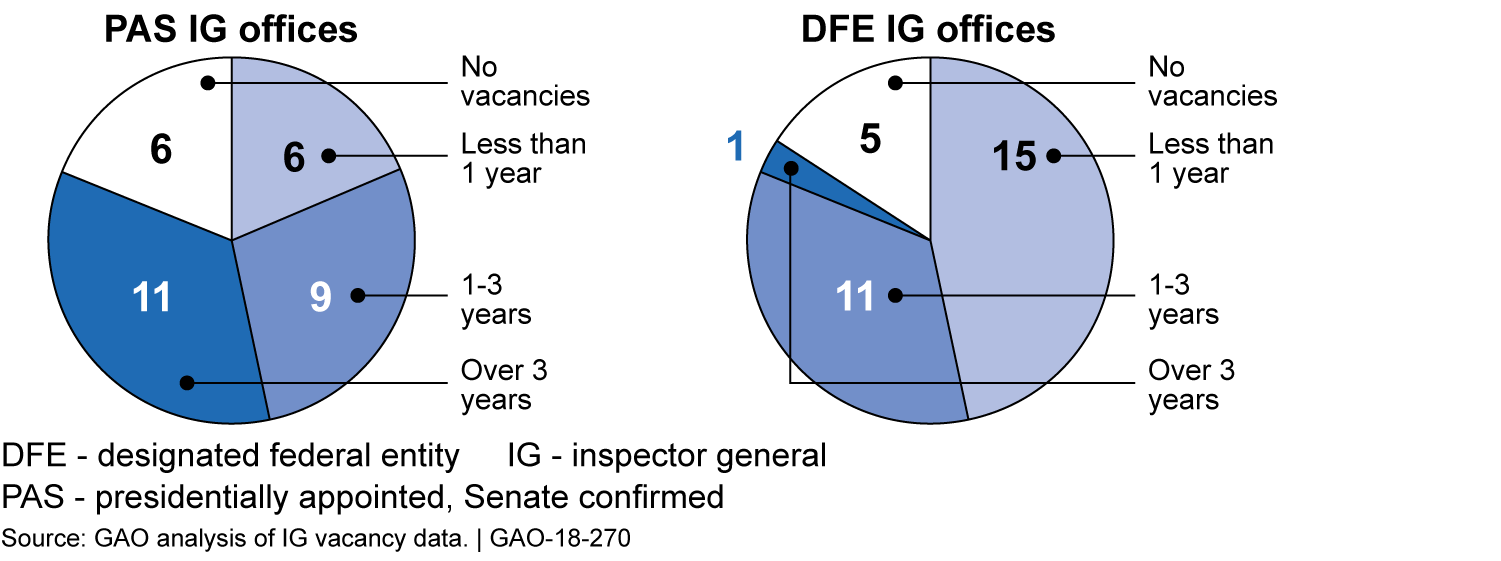Inspectors General: Information on Vacancies and IG Community Views on Their Impact
Highlights
What GAO Found
As of September 30, 2017, 12 of the 64 active offices of inspector general (OIG) established by the Inspector General Act of 1978, as amended (IG Act), had IG vacancies. Ten IG vacancies were in OIGs with presidentially appointed, Senate confirmed (PAS) IGs and two were in designated federal entities (DFE) with agency-appointed IGs. For the 10-year period covering fiscal years 2007 through 2016, 53 of the 64 IG Act OIGs experienced one or more periods of IG vacancy with the cumulative durations ranging from about 2 weeks to 6 years.
Cumulative Duration of Inspector General Vacancies, Fiscal Years 2007 through 2016

GAO's survey of nine acting IGs and a stratified random sample of OIG employees who worked under an acting IG, found both groups indicated that having acting IGs generally did not impact the OIGs' ability to carry out their duties and responsibilities. However, responses varied in the following areas:
Plan and conduct work. Overall, at least eight of the nine acting IGs responded “no impact” for the questions in this area. The estimated percentage of OIG employees who believed that working under an acting IG has “no impact” ranged by question from 49 percent to 69 percent, “negative impact” ranged from about 8 percent to 24 percent, and “positive impact” ranged from 6 percent to 13 percent.
Interact with agency management. The responses of seven of the nine acting IGs and 63 percent to 65 percent of OIG employees indicated that an acting IG position had no impact in this area. Approximately 16 percent of the OIG employees believed that there was a negative impact on timely access to documentation, while 7 percent believed that there was a positive impact.
Managing OIG and personnel. Four of the nine acting IGs and about 36 percent of OIG employees responded that an acting IG position had a negative impact on employee morale. An estimated 44 percent of employees believed that working under an acting IG had no impact on employee morale while about 10 percent believed it had a positive impact. Four acting IGs also responded that it had a negative impact on office restructuring.
With regard to independence, GAO's survey of permanent IGs found that while the majority who responded did not think that acting IGs are inherently less independent, they did indicate by a similar majority that an acting IG is less independent in appearance than a permanent IG, especially when the acting IG is applying for the IG position.
Why GAO Did This Study
The IG Act established OIGs to conduct and supervise audits and investigations; recommend policies to promote economy, efficiency, and effectiveness; and prevent and detect fraud and abuse. The Inspector General Empowerment Act of 2016 included a provision for GAO to review prolonged IG vacancies during which a temporary appointee has served as the head of the office. This report addresses (1) the status of IG vacancies as of the end of fiscal year 2017, and the number and duration of IG vacancies for fiscal years 2007 through 2016, and (2) the IG community's views about how IG vacancies impact the OIGs' ability to carry out their duties effectively, including views on the impact on independence.
GAO analyzed data related to IG vacancies; interviewed officials from the Council of the Inspectors General on Integrity and Efficiency (CIGIE); and conducted a web-based survey to obtain the views of (1) the 52 permanent IGs serving as of August 22, 2017; (2) 9 acting IGs who had served in OIGs that had vacancies of over 365 days during fiscal years 2014 through 2016; and (3) a stratified random sample of employees in OIGs with IG vacancies of over 365 days during fiscal years 2014 through 2016. Survey response rates ranged from 71 percent to 100 percent.
CIGIE and nine OIGs provided technical comments, which were incorporated as appropriate.
For more information, contact Beryl H. Davis at (202) 512-2623 or davisbh@gao.gov.
